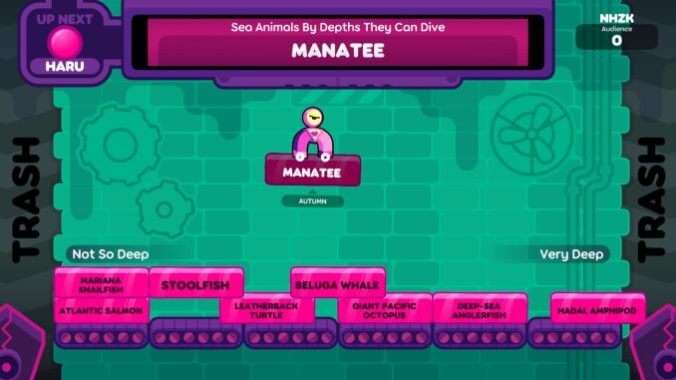Jackbox Party Pack 9 Delivers a New Round of Fun, Clever Party Games
Games Reviews jackbox party pack
Jackbox Party Pack 9 takes familiar and successful ideas from previous packs and stretches them into a handful of largely new, experimental, clever party games. Like every pack, not every game’s a winner, but even the worst Jackbox game makes for effective social lubricant and some great laughs with friends.
This time around, the lineup consists of one returning classic, Fibbage 4, and four new entries: Junktopia, Quixort, Roomerang and Nonsensory. Fibbage 4 is familiar territory for most people who’ve played the franchise at this point, since nearly half the packs have an iteration of Fibbage in them, but each game reps many of the tried-and-true elements of the Jackbox experience. The new games still have plenty of opportunities for players to caption things with quippy remarks and make crude drawings, but if Jackbox were just about putting fart jokes and phalluses on the TV, the novelty would’ve worn off years ago.
What keeps me and many of my friends coming back year after year is the connective tissue—the game’s prompts, concepts and scenarios that set us up for lasting in-jokes and room-shaking laughs. The ninth entry in the series still delivers on that front, though perhaps not with the same aplomb as some of my favorite entries, like 3 and 7.
Fibbage 4 is, as it sounds, all about slipping clever white lies past other players by combining general savvy with believable lies. Categories range from legal cases involving bees to the late Paul Newman’s driving skills. The eclectic mix of hyperspecific topics works better than your garden variety trivia game because players with knowledge about common topics like sports, entertainment or geography aren’t as easily rewarded. It also makes for some hilarious guesses at already absurd truths.
Junktopia takes elements from games like Bidiots and Talking Points from packs past and twists them into a fun presentation-style minigame. Players are given the option to choose one of three tchotchkes that they’ll need to buy then flip by convincing other players that the object (usually something bizarre like a scary naked doll or a stiletto that’s been made to look like a goldfish) is, in fact, worth buying. The player that makes the biggest profit at the end of the game wins. The developers try to infuse some extraneous risk-vs-reward mechanics in the shopping stage by allowing players to try and haggle for a lower price on their desired oddity.
Whether or not they’re successful is entirely up to chance, making it feel like an unnecessary step that breaks up the game’s already shaky pace. Plus, after a few runs at Junktopia, successfully haggling, outright deciding not to haggle, or failing—which increases the price—never seemed to have an impact on who won. A running complaint that a lot of my friends had with this pack was how long each game took. While I don’t necessarily agree that they took too long to play, I did find that many of the new games (Junktopia included) have some pacing issues that let what should be raucous stuff get a bit dull at times. Adding in extra decisions that don’t have much bearing over the final outcome of the game or your interactions with other players really highlights the problem here: there’s too much stuff happening between the best parts of the game.
Once players name their item and make up a few fun facts about said ware, it’s off to the races. Junktopia really shines when players are doing their best to sell a dusty old bottle or a rusted oil drum to the other players. It’s not quite as fun as Talking Points (which might be my favorite Jackbox game period) since the element of improvised chaos isn’t there. That said, it’s a great equivalent for players who aren’t as comfortable talking extemporaneously about a topic.

Quixort is another trivia-related game that pits two teams against each other, but instead of just guessing from a series of multiple choice options, teams need to work together to sort different items in a specific category, like lining up famous scientists based on when they were born. Mechanically, it’s a simpler game than the others in the pack. The challenge comes from working with your teammates quickly to get the right order. Because of that, it also gets people talking about the topics, which is always a welcome feature in any party game.
Roomerang got the least play with the groups I’ve played with. An attempt to lampoon various competition-based reality TV shows, Roomerang hinges heavily on roleplaying. Otherwise, it’s standard Jackbox fare: most of the game time’s spent answering prompts on your phone and voting on favorite answers. Players who don’t perform well will get voted out (and replaced with a doppelganger).
Like any number of other Jackbox games, a winner’s determined by score. I get that it’s generally never a good idea to eliminate or alienate players, but this game would be much more distinct from other Jackbox games if players that got voted off didn’t immediately come back. Sure, coming back is inherent to Roomerang’s title, but a permadeath of sorts would add some fun tension to the game. It could also help reign in the length of a full playthrough, which starts to drag about two-thirds of the way through.
Rounding out the pack is Nonsensory, a statistics-based guessing game hosted by a monkey. It’s a hard game to describe—though very easy to wrap your mind around. Two players are given a statement. A prompt might be something along the lines of “This is a band that’s X likely to have skeletons on an album cover,” with each player getting a different percentage prompt.
For 100% you might name a favorite metal group, but for 30%, you might want to get creative with a band that might surprise you if a skeleton showed up, but also that it wouldn’t be impossible. Players then try to guess where on the scale (intervals of 10%) the prompt originally was. Guessing the prompt correctly, or getting close to it, will net you points. At the end, scores are added up and the player with the best guesses and most accurate prompts wins.
This is another game that your mileage will really vary on. In a party setting, some people miss the percent-specific part of the prompt, which can lead to lots of confusion. It’s not hard to miss if you know what to look for, but it is delivered in a somewhat confusing way. When everyone’s on the same page, Nonsensory’s a good time, but it’s another trivia-adjacent game and doesn’t really separate itself enough from Fibbage 4, since it requires similar (though less precise) knowledge of trivia and some clever guesswork.
Nine games in, Jackbox has a tried and true ethos that, even in a lackluster pack, reliably delivers a great party game experience. As a game so late in the franchise, this ninth entry mostly plays things safe. Quixort’s a favorite new addition that brings some new team-based competition to the table, and presenting a cleverly-named artifact in Junktopia never gets old. Jackbox 9 doesn’t dethrone my personal favorites but it does bring new life to the party with some (expectedly) fun games that I’m excited to pull out the next time I have a few friends over or boot up with my family during the rapidly approaching holiday season.
Jackbox Party Pack 9 was developed and published by Jackbox Games. Our review is based on the Xbox version. It is also available for PlayStation, Switch, and PC.
Charlie Wacholz is a freelance writer and college student. When he’s not playing the latest and greatest indie games, competing in Smash tournaments or working on a new cocktail recipe, you can find him on Twitter at @chas_mke.